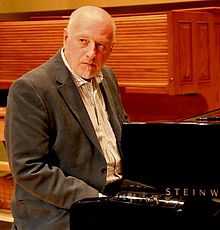Roger Doyle
| Roger Doyle | |
|---|---|
 | |
| Born |
1949 Malahide, Dublin, Ireland |
Roger Doyle (born 1949) is an Irish composer best known for his electro-acoustic work and for his piano music for theatre. He was born in Malahide, County Dublin.
Education
Doyle studied piano from the age of nine. After leaving school he attended the Royal Irish Academy of Music for three years studying composing, during which time he was awarded two composition scholarships. He also studied at the Institute of Sonology at the University of Utrecht in the Netherlands and the Finnish Radio Experimental Music Studio on scholarships.
Early Work
Doyle began as a drummer with Supply Demand and Curve and Jazz Therapy, playing free-improv and fusion music. He composed the album Rapid Eye Movements, including the work "Fin-estra", as his attempt at a 'masterpiece before the age of thirty'. He released his first LP, Oizzo No, in 1975, and his second, Thalia, in 1978 on CBS Classics. Rapid Eye Movements was his third LP.
Electro-acoustic and other work
Doyle began his magnum opus, Babel, in 1989 - a 5-CD set that took ten years to compose. Each track corresponds to a 'room' or place within an imagined giant tower city - a kind of aural virtual reality. It celebrates the multiplicity of musical language. 103 pieces of music were composed for it and he worked with 48 collaborators.[1] From 2002-2007 he worked on the 3 volume electronic work Passades. 21 albums of his music have been released.[2]
Doyle has also composed scores for several films including Budawanny, Pigs and the documentary Atlantean by Bob Quinn.[3] His most recent work is the opera The Death By Fire Of Giordano Bruno (2013-14).
Theatre
Doyle founded the music-theatre company Operating Theatre with Irish actress Olwen Fouéré. They produced many important site-specific productions, including Passades, Here Lies and Angel/Babel, all featuring Doyle's music.[4] With Icontact Dance Company, Doyle produced Tower of Babel - Delusional Architecture, featuring as much of his magnum opus, Babel, as he had composed by then. This work was originally performed in a whole wing of the Irish Museum of Modern Art in 1992. Arguably Doyle's most famous theatre work is the music he wrote and performed for the Steven Berkoff version of the Oscar Wilde play Salome. The Irish Times noted that "his name is revered in the realm of theatre".[5]
Critical Reception
Doyle's works "Four Sketches" and "All the Rage" were awarded second and first prizes in the Dublin Symphony Orchestra composition competition in 1970 and 1974 respectively. He has won the Programme Music Prize (1997) and the Magisterium Prize (2007) at the Bourges International Electro-Acoustic Competition in Bourges, France. He also won the Irish Arts Council's Marten Toonder Award in 2000 in recognition of his innovative work as a composer.[6] Doyle is a member of Aosdána, and has recently been made Adjunct Professor of Music at Trinity College, Dublin.
The Irish Times described his album Chalant - Memento Mori as "a richly rewarding work that runs the full, glorious gamut of human emotion". It was Album of the Week on March 30, 2012 in the same paper.[7]
Babel was re-released in 2013 and received this review from Fanfare Magazine (USA) January 2014: This is a phenomenal listening experience of Wagnerian dimensions ─ and, arguably, Wagnerian ambitions. The whole concept is amazing...an impeccably imagined alternative world exoerience. Fascinating, and well worth the time required to properly immerse oneself in the weird and wonderful contents of Roger Doyle's head.
Influences
As a teenager Doyle was influenced by Stravinsky, Debussy, Pierre Henry and The Beatles.
Selected Discography
- Fairlight Memories
- Baby Grand
- Cool Steel Army
- Babel[8]
- The Ninth Set[9]
- Passades - Volumes 1&2
- Rapid Eye Movements
- Thalia/Oizzo No
- The Room in the Tower
- Chalant - Memento Mori[10]
- The Thousand Year Old Boy[11]
References
- ↑ http://www.rogerdoyle.com/biog.php
- ↑ http://www.rogerdoyle.com/discog.php
- ↑ http://www.imdb.com/name/nm0236487/
- ↑ http://www.rogerdoyle.com/biog.php
- ↑ http://www.irishtimes.com/newspaper/theticket/2012/0330/1224314065871.html
- ↑ http://www.cmc.ie/composers/composer.cfm?composerID=35
- ↑ http://www.irishtimes.com/newspaper/theticket/2012/0330/1224314065871.html
- ↑ http://rogerdoyle1.bandcamp.com/album/babel-temple-music
- ↑ http://rogerdoyle1.bandcamp.com/album/the-ninth-set
- ↑ http://www.rogerdoyle.com/discog.php
- ↑ http://rogerdoyle1.bandcamp.com/album/the-thousand-year-old-boy
External links
- Official website
- http://rogerdoyle1.bandcamp.com/
- Roger Doyle at the Internet Movie Database
- http://www.rogerdoyle.com/discog.php
- http://cmc.ie/composers/pdfs/35.pdf
- http://www.operatingtheatre.ie